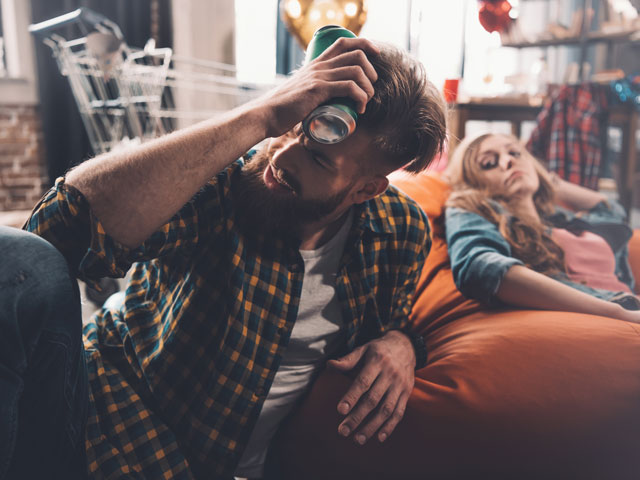Why Does Beer Cause Headaches & Migraines?
As a beer drinker, you’re likely familiar with the hangover headache that can follow up an otherwise fun night. As many as 92% of people claim to have experienced a headache after enjoying just one too many drinks. But why exactly does overindulging with beer give us a headache?
Written by CraftJack | Updated | 6 min read
Interesting Tools
- Beer BrüMate Hopsulator
- Brewing Northern Brewer Beer Making Kit
- Spirit Crystal Whiskey Glasses
- Wine Wine Decanter/Aerator

Several different components found in beer can contribute to a hangover headache in the following hours or even days. Our background and lifestyle can also affect the severity of our hangovers. Fortunately, there are plenty of ways to nurse a hangover and prevent more from happening in the future.
The Basics of Alcohol-Induced Headaches
Whether you’re drinking beer, white wine, or something a little bit stronger, like say a whiskey (neat), too much too quickly is likely to give you an alcohol-induced headache. Understanding the basics of your symptoms is the first step towards treating yourself and returning things to normal.
Types of Alcohol-Induced Headaches
There are two main types of headaches that people experience after drinking alcohol, including immediate and delayed alcohol-induced headaches.
Immediate
Some people experience a headache within three hours of consuming alcohol. Pain is usually on both sides of the head and has a pulsating quality to it. In many cases, people suffering from an immediate alcohol-induced headache will have trouble engaging in physical activity. Symptoms don’t usually last more than 72 hours after the last drink.
Delayed
More often, a alcohol-related headaches won’t manifest until your blood alcohol level begins to drop. A delayed alcohol-induced headache won’t usually begin until 5 to 12 hours after your last drink. You can usually hope to see symptoms subside within 72 hours of their onset. A delayed hangover headache can be more intense than an immediate reaction. Many people compare the pain to that of cluster headaches or migraine attacks.
How Beer Causes Headaches
The type of hangover you experience depends on a few factors, such as the amount you drink and how quickly you drink it. Drinking copious amounts quicker than your liver can process will almost certainly result in a hangover. Your diet also plays a role, as a full stomach can slow the absorption of alcohol.
The type of beer you drink and the quality of the brew can significantly impact whether you experience a headache afterward. Poor-quality beer often contains higher levels of components such as congeners and fusel alcohols that are known to cause pain and inflammation.
Finally, genetics also plays a role in alcohol absorption and hangover symptoms. Some people are equipped to handle alcohol better than others and are more adept at breaking down byproducts. These people are less likely to experience hangovers, and when they do, the results will be less severe.
Regardless of your background or drinking habits, enough of any type of beer will leave you with a hangover headache afterward. Certain ingredients and other components can lead to headaches and worse in the following hours.
Ethanol Poisoning
Ethanol is the main component in a pint of beer, glass of wine, and other popular alcoholic beverages. While toxic in large amounts, small amounts of ethanol produce the pleasant “buzz” that people experience when tipsy or drunk. Unfortunately, it can be challenging for us to judge our own limits. Often the amount of alcohol we drink is more than our liver can process, leading to classic hangover symptoms, and in some cases, migraine headaches.
As a vasodilator, ethanol can cause the tiny veins in your brain to expand. As blood vessels swell, they can stretch out the surrounding nerves and send pain signals to the brain, leading to moderate to severe headaches.
Ethanol is also a diuretic, which means it signals your body to urinate more frequently than usual, which often leads to dehydration, and the resulting fluid loss can cause an imbalance that triggers a nasty headache. Because that’s just what your body wants during a night of long partying, excessive urination.
While mild cases of over-consumption often resolve themselves, in some cases, alcohol poisoning requires medical intervention. If a person is showing signs of confusion, slowed breathing, or an abnormally low body temperature, seek medical attention immediately. In truly excessive quantities, alcohol triggers serious debilitating effects, possibly pushing your body toward sudden death. Be extremely careful when consuming alcohol.
Toxic Byproducts
Certain alcohol byproducts known as congeners can contribute to a hangover headache. They impede the breakdown of ethanol, making the effects of a hangover stronger and longer-lasting. They can also trigger stress hormones and inflammation, worsening an already brutal headache.
Fortunately, beer is fairly low in congeners, especially the lighter varieties. You can find the most congeners in dark alcohols and liquors such as red wine, whiskey, scotch, and more.
Fusel alcohols are another byproduct that can lead to a pounding headache after drinking. Fusel alcohol is a byproduct of fermentation. It not only increases the likelihood of a hangover but also sours the taste of beer, especially home-brewed varieties.
Excess Histamines
Histamines are a natural part of our immune system that our bodies use as a first line of defense against invading pathogens. As anyone with allergies can tell you, though, an influx of histamines can end up doing more harm than good by causing inflammation, muscle aches, and headaches.
Beer contains histamines that can trigger your immune system to release its own histamines. As a result, you may suffer symptoms similar to having an allergy after drinking. Redness and inflammation around the face and body are both common, as are related headaches.
Fluctuating Hormones
Serotonin is one of our most notorious “feel good” hormones and helps us to regulate mood, sleep patterns, and more. When we drink beer, it stimulates our body to produce more serotonin, which is responsible for the sense of well-being that comes alongside a good buzz.
However, once the effects of a drink have worn off, serotonin levels drop off, and our body struggles to maintain balance. Not only can this lead to anxiety and depression, but also headaches.
How to Treat a Hangover Headache
While there’s no magic cure to get rid of a hangover, you can take steps to speed up the recovery process and ease symptoms such as headaches. The best thing you can do is rest and make sure you hydrate by drinking water. Water will help to re-hydrate you after the diuretic effects of beer. You can also try other hangover cures such as:
- Over-the-counter pain medicines such as Tylenol or Ibuprofen
- A forehead compress, either chilled or heated
- Electrolyte-rich beverages such as sports drinks
- Eating carb-rich foods such as bread or crackers
- CBD or THC products (in legal states)
- Gentle exercise or stretching
- A deep tissue massage
Many people make the mistake of trying the “Hair of the Dog” approach to hangovers. Despite how famous this method seems to be, it’s one of the worst things you can do to treat a headache after drinking. While you may feel better temporarily, you’ll only be prolonging the inevitable. This approach will simply drag out symptoms, and you may find your hangover lasting for longer than the typical 72 hours.
How to Prevent a Hangover Headache
The best way to treat a hangover is through prevention. By taking proper precautions before alcohol consumption, you can avoid symptoms such as a hangover the following day. You also reduce your chances of more serious problems such as alcohol poisoning.
It might seem obvious, but the best way to avoid a hangover is by limiting alcohol intake. The more that you drink, the stronger and longer-lasting your hangover symptoms will be. Try to drink beer in moderation and stretch out drinking over several hours.
Drinking plenty of water throughout the night can also help you avoid regretting that last beer the next day. By interspersing alcoholic drinks with water, you can stay hydrated. Remember to continue drinking water even after you’ve finished your final beer to avoid dehydration.
Eating food is just as important as drinking water during alcohol use. If you have alcohol on an empty stomach, it will speed up absorption and increase your chances of both immediate and delayed headaches. It’s a good idea to fill up on nutritious, filling foods such as eggs, dairy, and lean meats before heading out on the town.
At the same time, there are also foods that you should avoid before and after drinking. Certain nutrients can trigger headaches or migraines, especially when alcohol is present in your system. You should avoid foods containing high levels of:
- Tyramine
- Phenylethylamine
- Tannins
- Sulfites
- Flavonoid phenols
Foods high in these components include dried fruits, hard cheese, and cured or processed meats. It’s best to avoid these dishes when you plan on drinking beer. Otherwise, even a small amount may lead to a headache later on. You also put yourself at a higher risk of an immediate alcohol-induced headache, which may put a damper on your evening.
The most effective way to prevent tension headaches or a migraine trigger is abstinence. Not drinking is easier said than done for some, but it is the only proven, time-honored way to prevent alcohol-induced headache disorders.
Wrapping Up
Hangover headaches are one of the most common effects of alcohol. Plenty of people experience pain and inflammation after a night of heavy drinking. Components of beer such as ethanol can lead to imbalances in our bodies, causing hangover symptoms such as headaches.
Fortunately, it’s easy to treat an alcohol-induced headache with plenty of rest, water, and TLC. You can also take steps to prevent headaches and other hangover symptoms in the future.
